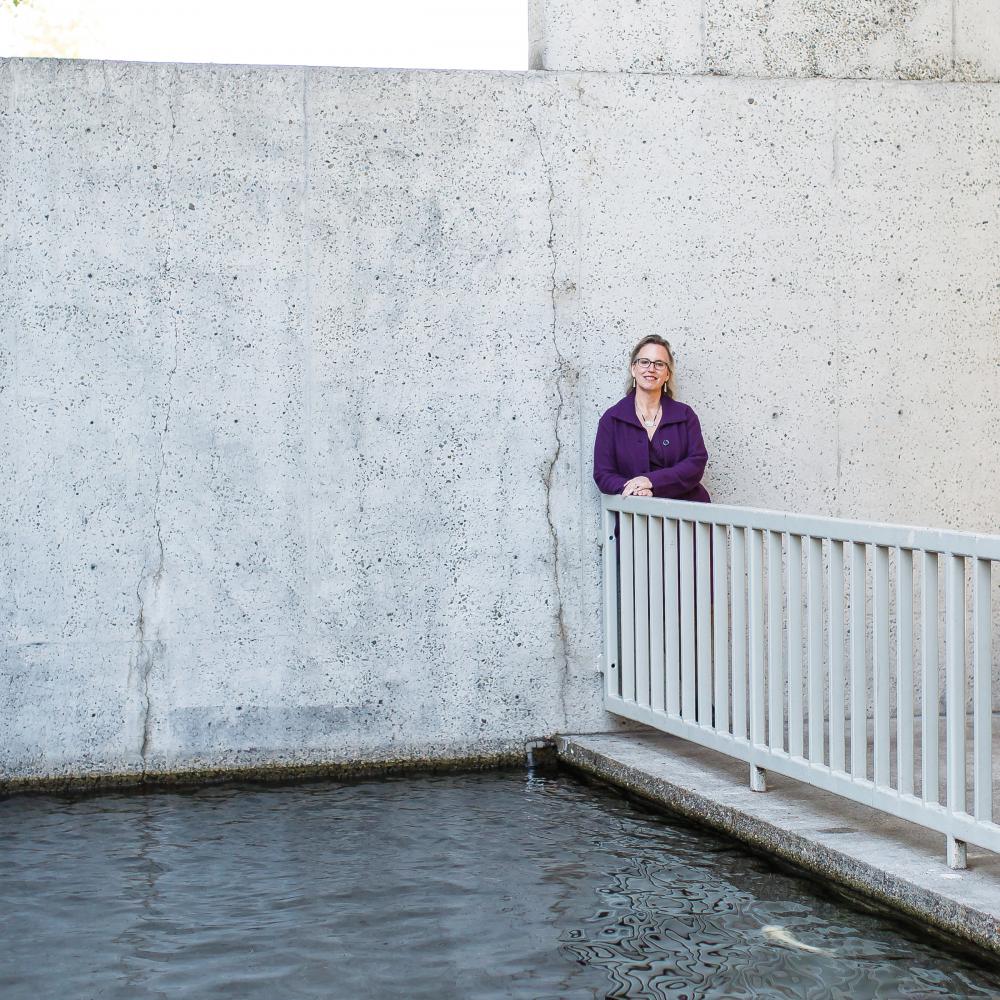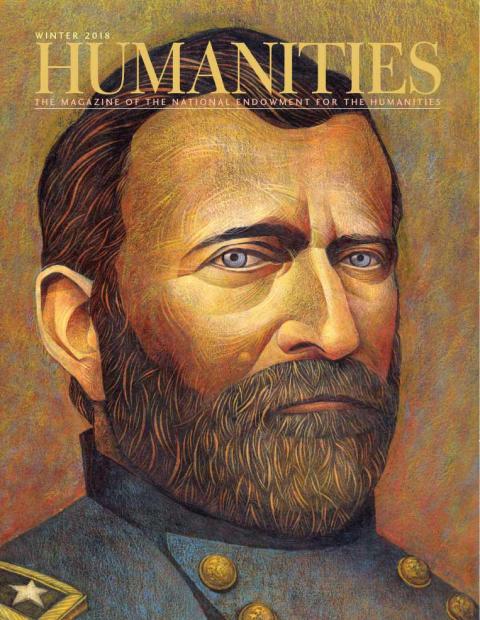Travel a couple thousand miles northeast of the urban corridors of Julie Fry’s office in downtown Oakland, and you will find the small Wisconsin town of Port Edwards, where her lifelong love of the humanities began. Growing up amidst cranberry bogs and paper mills, Fry, the daughter of one of the town’s three third-grade teachers, would curl up in her living room chair, devouring endless stacks of chapter books. With every turn of the page, she began to recognize the transformative power of meeting new characters and listening to different voices.
“Reading those stories gave me access to the world outside of my small town of 2,000 people.” she says. “That early grounding in literature has really informed every part of my life.”
After majoring in economics and minoring in French, and earning an MBA, Fry started her career working in business administration. In each of her new homes, from Minneapolis and Houston to Liverpool, England, and San Diego, she always remained engaged with the humanities and arts as a volunteer, patron, and musician. When she later transitioned to working for arts nonprofits, Fry realized she could play an active role in supporting the range of literary and artistic voices that had once captivated her as a child reading in that living room chair.
Since Fry came on board as president and CEO of California Humanities in early 2015, amplifying the state’s diversity of voices has been at the heart of her goals and vision for the organization.
“It’s hard to imagine another place where there’s so much diversity in every way: cultural, racial and ethnic, political, economic, even topographical,” she says. “In a state this large and complex, there are so many things to understand about each other. It’s so essential that California Humanities help lift up that rich tapestry of voices in various ways.”
What does it mean to reside in California, where more than 25 percent of individuals come from outside the country? What does it mean to become an American or a Californian? How do residents share their stories and cultures while also building their lives? And how can they better understand each other and find shared values in this varied landscape?
There are no simple answers to these questions in a state that holds nearly 40 million residents and is the world’s sixth largest economy. But, for Fry, these are precisely the sorts of essential questions that California Humanities is currently poised to address through its range of public programming, grantmaking, and outreach.
When Fry joined the organization three years ago, it was considering how to celebrate its 40-year anniversary. Fry saw this as a time not only to strengthen many of its existing endeavors but also to develop a new strategic framework to guide the growth of its next phase. The five-year strategic focus that emerged from her team’s statewide listening tour and other inputs revolves around three components: engaging future generations through K-16 humanities education, responding more deeply to community needs through grantmaking and programs, and incorporating greater collaboration with the state’s other humanities organizations and practitioners.
Youth Perspective and the Future of California, a yearlong initiative in partnership with four of the state’s community colleges and youth media organizations, is one of two new youth-focused projects Fry says she’s excited to see unfold. The initiative is part of the national Democracy and the Informed Citizen program that was created by the Federation of State Humanities Councils and funded by the Andrew W. Mellon Foundation.
California is home to an estimated 13 million residents under the age of 25—more than the entire population of 46 other states. How can these potential leaders of California best explore and wrestle with issues that directly affect their future? This initiative will facilitate public conversations with leading journalists, participatory media literacy activities, and efforts to bring youth voices to the greater public via podcasting, blogging, and op-eds.
The other project, CALIFORNIA 2020: California’s Youth and the Future of California, intends to capture a broad cross section of young people’s stories and highlight the voices and perspectives of soon-to-be-voting teens. California Humanities will commission professional documentarians and partner them with young storytellers across the state. Filmmakers will serve as mentors and collaborators for the participants, and each team will produce a 7- to 10-minute documentary.
Fry also has high hopes for the Library Innovation Lab project during its second year. In its pilot phase, the Lab provided resources and support to a cohort of librarians developing public humanities projects aimed at underserved immigrant groups in their communities. The Humanities for All grants put the emphasis on new audiences “across the nonprofit ecosystem, from grassroots organizations to major institutions,” says Fry. These new efforts complement existing programs such as Literature and Medicine, a humanities-based reading and discussion program for health care workers, and the California Documentary Project, which provides grants for media projects that tell the stories of the state and its people.
At the root of all these efforts, Fry explains, is both the organization’s belief that the humanities are essential to a thriving democracy and their mission to build bridges of understanding and strengthen voices across the state.
“Equity is at the heart of what we do,” she says. “To me, that’s really critical—this is about multiple perspectives, not just me over here and you over there. Let’s bring everyone to the table.”
Tell me more, Julie
What historical event would you like to have attended? Martin Luther King Jr.’s “I have a dream” speech in Washington in 1963.
My favorite California artifact . . . is Frank Lloyd Wright’s Hanna-Honeycomb House on the Stanford University campus. With no right angles in the floor plan, it is a shining example of his affordable home designs.
You were a voracious reader as a child. Were you also a writer? Absolutely! Under the nom de plume Jasmine DeAburene, I wrote short stories about the pioneers, clearly influenced by Laura Ingalls Wilder.
Name three books that you think you should have read but have not. I started them all years ago, but I have never finished Silent Spring by Rachel Carson, The Good Earth by Pearl S. Buck, and On the Road by Jack Kerouac.
What skill do you have that surprises people? I have an uncanny and not always useful ability to remember songs and lyrics, particularly by Led Zeppelin and the Beatles. (My first job in Liverpool was on Penny Lane.) I also am prone to breaking into song at the drop of a hat. My kids do appreciate this about me—most of the time.


